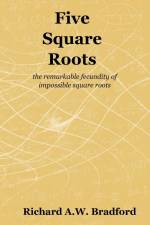von Richard A. W. Bradford
36,00 €
This book illustrates through five examples how certain square roots, which initially seemed impossible or meaningless, have been achieved. In each case the achievement has opened up a whole new vista of mathematics or physics. In each case our understanding and our intellectual power has been dramatically increased as a result. This is a maths book, a book about maths, and also in its later parts a physics book. But, undoubtedly because I am a physicist, even in the earlier parts it is the calculational power which the mathematics provides that interests me most, rather than mathematical rigour per se. These impossible square roots are astonishingly fecund, not just within mathematics itself but within physics too - and elsewhere. Whence cometh, as Eugene Wigner had it, this "unreasonable effectiveness of mathematics in the natural sciences"? It is as mysterious as ever. This is not a book which obsesses about mathematical pedantry. Despite treating some rather "simple" subjects, it is not a book about foundational issues either, though we will be obliged to touch briefly on such matters in chapter 1. In this book we will be heading in the opposite direction: the direction which is primarily about building ever richer mathematical structures. In addressing the square roots which form the principal subject of each of the book's five chapters, I take the opportunity to wax discursive on what springs from them. The subject matter of the book is not merely the roots, but the whole plant which grows therefrom. Well, not the whole plant, of course - that would hardly be possible. But sufficient, I hope, to give some indication of the unexpected luxuriance which unfolds from these roots. It is possible that much of the book will appeal to a general reader without (say) A Level knowledge of maths, though chapter five will be an exception. Certainly, the book is not intended for the expert, who would find the contents elementary and also a rather random selection (being chosen largely by the author's fancy from a virtual infinity of options). The likely appreciative audience (if I may presume that to be a non-null set) will be keen A Level students of maths or physics, or undergraduates of these subjects. I flatter myself that even postgraduate physicists may find things here to entertain or enlighten. Contents1. The Square Root of 22. The Square Root of -13. The Square Root of Probability4. The Square Root of Not5. The Square Root of Geometry12 Appendices

